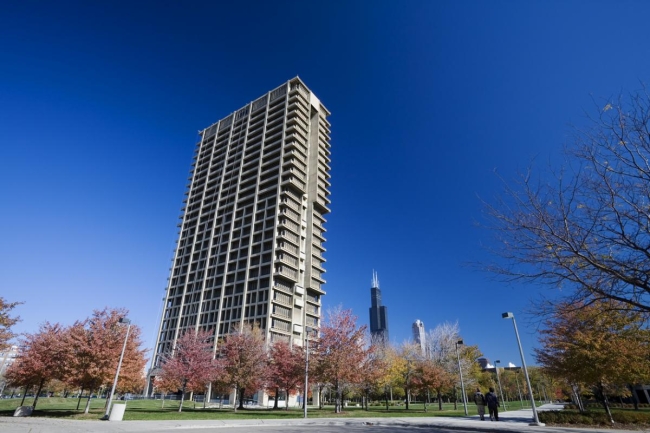You have /5 articles left.
Sign up for a free account or log in.

A campus building at the University of Illinois at Chicago
ISTOCK.COM/stevegeer
Health care for the summer. Mental health counseling. Assurance that hand sanitizer will be available on campus.
These might seem like obvious changes universities would make for graduate student workers after the COVID-19 pandemic hit. But some have had to fight for protections like these.
The University of Illinois Graduate Employees Organization, UIC GEO, which represents all graduate employees at the university's Chicago campus, won these protections along with free summer housing for international students and hundreds of jobs to help graduate workers make ends meet over the summer.
The organizing work was tedious, said Jared O'Connor, co-president of the union. The university was holding town halls on Zoom but was only leaving a few minutes for questions.
"I basically had to wave emphatically on Zoom to ask questions," he said. "We just felt like they were asking us to speak up, but they didn’t give us a platform."
The union ended up using the impact bargaining process through the university's human resources department to get the requested policies in writing.
The group's main concern was, and still is, health care. While it won the expansion of mental health services and the expansion of health care in the summer, O'Connor plans to push for more.
Graduate students normally pay $250 per semester for health care. For three months of coverage this summer, they'll have to pay $450. Some graduate students who are working in labs over the summer can't afford the health-care plans, opening the door for a potential hotbed of the novel coronavirus.
"It’s very frightening that, in a global pandemic, the university was very reticent to cover health care at a lower cost," O'Connor said.
In future bargaining, the UIC GEO plans to fight for free, or at least cheaper, health-care coverage.
"Something like COVID-19 could happen whenever," he said.
Many of the other wins will help international students especially. These students were worried about where they would live, where they would work and how they would have health care if they couldn't return home due to the pandemic, said Zukhra Kasimova, a member of the international student caucus and union steward.
To maintain their visas to continue studying in the U.S., international students also need to show they are enrolled in credits. If they can't enroll because of financial troubles due to the downturn, they're stuck. Their visas also don't allow them to work off campus.
"International students face additional burdens during the pandemic," Kasimova said.
To solve these issues, the union secured free summer housing, as well as several hundred summer jobs for all students, Kasimova said. The jobs include building out shells for online classes and teaching assistantships. It also won a new policy that lets all graduate students enroll in classes for the next semester with an account balance of up to $1,500.
The University of Illinois at Chicago did not provide a response to a request for comment in time for publication.
Graduate students at several universities, like Brown and Georgetown Universities, have recently won their first bargaining contracts despite all the odds. Many of the contracts include specific COVID-19 protections, like expanded health care and appointment extensions.
"It basically defies conventional wisdom that everything would be frozen in place, that nobody would try to actually solve problems through collective bargaining," said Randi Weingarten, president of the American Federation of Teachers, with which many of these unions are affiliated. "What you’re seeing here is that even the administration understood that their workforce, whether they are faculty or graduate student workers, they’re really necessary for the survival of the university."
Many of the wins for Brown students -- an emergency fund for COVID-19 relief, plans for restarting research stipends -- "actually created a very good way of keeping the university viable," she said.
A spokesman for the university said Brown took several steps to support graduate students during the pandemic.
"In the immediate wake of the pandemic’s arrival, Brown implemented multiple measures to support graduate students, including a COVID-19 emergency fund, extended time and stipend support, summer funding opportunities, and extended health insurance coverage for May 2020 graduates," a statement from the university says. "We have continued to discuss COVID-19 support with our graduate student population and, independently, with the union representing graduate student workers during the collective bargaining process. In all of those conversations, our commitment has been to the health and well-being of our graduate students and to working collaboratively to support the continuity of their academic experiences at Brown."
When asked if the pandemic and ensuing recession have given birth to a revival of unions, Weingarten said unions have been increasing in popularity for several years.
"The great inequality of the current economic environment makes it clear that you need to join together to change those rules," she said.
As to whether she is surprised that graduate students had to fight for some of these COVID-19 protections, Weingarten said she never feels that way anymore.
"This should’ve been something you could get without fighting for, but it wasn’t," she said.
Graduate student workers at the University of Texas at Austin were some of the first to win protections related to COVID-19.
Underpaid at UT, an informal branch of the Graduate Student Assembly, drew up a petition demanding extensions of funded time to completion, guarantees that workers wouldn't lose health insurance due to suspension of work activities related to the coronavirus, reduced graduate summer tuition and financial and legal support for international students, among other things. While public workers are allowed to organize and form unions in Texas, they are not allowed to use collective bargaining.
They gathered about 1,400 signatures in four days, according to Megha Joshi, a member of the base-building committee of Underpaid at UT.
There was a demonstration and testimonials from dozens of students, Joshi said. Eventually, on June 5, the dean of the Graduate School responded and addressed each of the demands from the petition.
The group won short-term job opportunities and more teaching assistant positions, lower summer tuition and a guarantee to not increase tuition for graduate students for the next two years, and a commitment for plans to work on a new health-care plan with no coverage gap.
The group didn't win one of its larger asks, which was a commitment from the university to not reopen until the Centers for Disease Control and Prevention say it is safe to do so.
"A lot of graduate students are also worried about UT opening," Joshi said. Many would go back to research positions, and they have to clean those areas themselves, she said.
When asked for comments on why the graduate student workers had to organize to secure these protections, a spokesman for UT Austin said the Graduate School dean has been emailing students weekly about COVID-19 policies, not just the one time on June 5. That email provided an overview of resources, some of which were developed before the petition was circulated, the spokesman said. Indeed the university provided emails from April and May that were sent to the graduate students.
The university also provided the following statement:
"For the past two years and since the onset of the COVID-19 pandemic, the university has been working closely with graduate students to identify needs and develop resources and policies to help during this unprecedented time. Many resources and accommodations were available to students during the spring semester prior to student petitions. These new resources were a response to the pandemic as well as the university’s ongoing Graduate Education Task Force, which recommended increased resources for health care and mental health, finances and job placement. The university continues to work with graduate students on solutions to mitigate the ongoing impact of the pandemic. We appreciate our students’ self-advocacy. We work closely with the Graduate Student Association and departments to address the evolving needs of students. For example, the university has conducted town halls and worked with the Graduate Student Association to complete a survey of our graduate students on COVID-19 issues that will inform how we move forward in the coming semesters."








